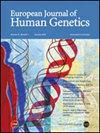Uncovering genetic diversity and admixture of British Africans with HLA alleles inferred from whole genome sequencing
IF 4.6
2区 生物学
Q2 BIOCHEMISTRY & MOLECULAR BIOLOGY
引用次数: 0
Abstract
The human leukocyte antigen (HLA) region is highly diverse and plays a crucial role in immune regulation and antigen presentation. Accurate HLA typing is essential for understanding disease susceptibility, transplantation compatibility, and pharmacogenetics. However, its application in African descent populations is challenging due to complex linkage disequilibrium patterns and the lack of ancestry-matched populations in HLA reference panels. Here, we leveraged the latest whole-genome sequencing (WGS) data from UK Biobank African individuals to perform better HLA genotyping, and further utilized allelic and haplotypic data to explore population genetics patterns of this region. With WGS-inferred HLA alleles, we identified specific admixture patterns (predominant West and East African and minor European ancestries) within British African population, revealing their complex evolutionary history. Not only did we reveal the genetic diversity within this population, but also highlighted its differences from African Americans, ancestral Africans, and other global populations. We further identified regional ancestry differences in the HLA genomic region, highlighting discordance between global and local admixture estimates. British Africans also presented unique HLA frequency distributions for both typical and disease-associated alleles or haplotypes. These findings emphasize the need for expanding African-specific HLA reference panel and prove better HLA typing can be achieved by coupling sequencing technologies with computational approaches. The HLA genetic characteristics observed in British Africans provide valuable insights into population-specific immune responses and susceptibility. Overall, this study advances our understanding of HLA diversity and genetic admixture in British African population, with important implications for both disease mechanism and clinical utility.

揭示英裔非洲人HLA等位基因的遗传多样性和混合。
人类白细胞抗原(HLA)区域是高度多样化的,在免疫调节和抗原呈递中起着至关重要的作用。准确的HLA分型对于了解疾病易感性、移植相容性和药物遗传学至关重要。然而,由于复杂的连锁不平衡模式和HLA参考面板中缺乏祖先匹配的人群,其在非洲后裔人群中的应用具有挑战性。在此,我们利用来自UK Biobank非洲个体的最新全基因组测序(WGS)数据来进行更好的HLA基因分型,并进一步利用等位基因和单倍型数据来探索该地区的群体遗传模式。利用wgs推断的HLA等位基因,我们在英属非洲人群中确定了特定的混合模式(主要是西非和东非血统,少数是欧洲血统),揭示了他们复杂的进化史。我们不仅揭示了这个人群的遗传多样性,而且强调了它与非裔美国人、非洲祖先和其他全球人群的差异。我们进一步确定了HLA基因组区域的区域血统差异,强调了全球和局部混合估计之间的不一致。英裔非洲人在典型和疾病相关等位基因或单倍型上也表现出独特的HLA频率分布。这些发现强调了扩大非洲特异性HLA参考小组的必要性,并证明通过将测序技术与计算方法相结合可以实现更好的HLA分型。在英国非洲人中观察到的HLA遗传特征为人群特异性免疫反应和易感性提供了有价值的见解。总的来说,这项研究促进了我们对英裔非洲人HLA多样性和遗传混合的理解,对疾病机制和临床应用都有重要意义。
本文章由计算机程序翻译,如有差异,请以英文原文为准。
求助全文
约1分钟内获得全文
求助全文
来源期刊

European Journal of Human Genetics
生物-生化与分子生物学
CiteScore
9.90
自引率
5.80%
发文量
216
审稿时长
2 months
期刊介绍:
The European Journal of Human Genetics is the official journal of the European Society of Human Genetics, publishing high-quality, original research papers, short reports and reviews in the rapidly expanding field of human genetics and genomics. It covers molecular, clinical and cytogenetics, interfacing between advanced biomedical research and the clinician, and bridging the great diversity of facilities, resources and viewpoints in the genetics community.
Key areas include:
-Monogenic and multifactorial disorders
-Development and malformation
-Hereditary cancer
-Medical Genomics
-Gene mapping and functional studies
-Genotype-phenotype correlations
-Genetic variation and genome diversity
-Statistical and computational genetics
-Bioinformatics
-Advances in diagnostics
-Therapy and prevention
-Animal models
-Genetic services
-Community genetics
 求助内容:
求助内容: 应助结果提醒方式:
应助结果提醒方式:


